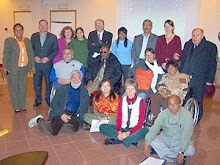Comments from Henry Tabares, President of ASODISPIE, on learning self-care skills.
As part of our project, we met in disability groups every month. In these groups we shared our experiences, we learned from professionals and we practiced our skills. The group sessions were important to us because we learned from each other as well as from the professionals. I found that my own concept about certain things, such as catheterization, was challenged by what I heard or by what I read, and I needed to change the way I was doing them. And I have had good results from the changes I have made. But my issues are not the same as those of the next person with quadriplegia and for this reason it is important to have individual teaching as well as the teaching in a group. Teaching in a group is fine for generalities, but for specific issues the teaching is better on an individual basis.
But for people newly injured (eg. spinal cord injury) the group was essential because they can avoid the pitfalls that we fell into because of lack of teaching. And this is where the group leaders are important because they can teach them about their condition. The group is also a motivator for the newly injured person and can help them alter their perception of life after injury.
The professionals (health and social) were important to helping us build our knowledge and skills. It was important to us to have both theory and practice in our sessions. Theory is fine but is incomplete because it is only in your mind. It has to be put into practice in order to verify it and to see if it is useful. The practice is what helps us for daily life.
The teaching was not only one-way. The professionals also learned from us. This interchange usually came through practice sessions. They learnt to see us individuals and to learn about our individual needs. There is knowledge that is common to all but there also a knowledge that comes from recognizing the differences between people and how the same condition is manifested differently in each of them. This difference alters the practice of the skill between people and it is important to recognize that this difference occurs. It is important to see the person.
Information on self care does not exist here. We used materials that were made available to us through the project and we had some videos from another disability organization called PROJIMO. Actually, it would make a great project to write a manual on self-care based on what we have learned in our project.
Henry Tabares, ASODISPIE, Colombia
Wednesday, June 18, 2008
Subscribe to:
Post Comments (Atom)


No comments:
Post a Comment